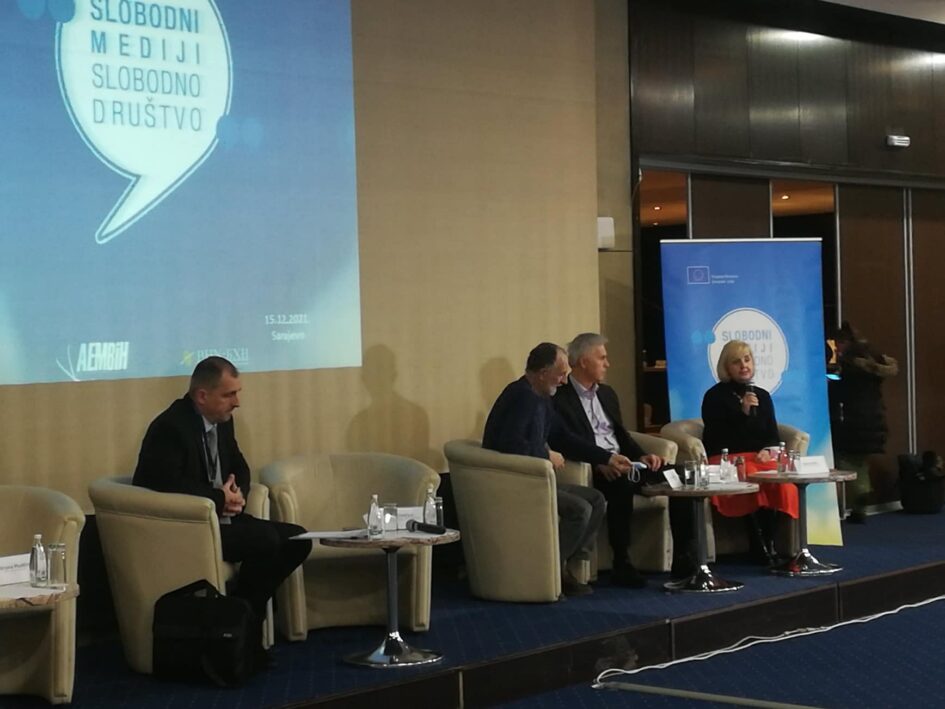
Sarajevo, December 15, 2021 – The final conference “Free Media for a Free Society”, which presented the results of a three-year consortium project consisting of the BH Journalists Association and the Association of Electronic Media (AEM) in BiH, with the support of the European Union, was held today at the Holiday hotel in Sarajevo.
As it was pointed out, in the past three years, the Project Consortium conducted five researches on the quality of media content in local media, on working conditions and rights of journalists, and on the level of media literacy of civil society organizations. An Interactive Online Center (HUB) for media content exchange and advocacy for the independence and integrity of journalists has been established, which will also serve as a training space on ethical and journalistic standards and investigative journalism, as well as a LAB for media content production. In addition, active efforts were made to strengthen the capacity of journalists and members of civil society organizations in local communities for the professional and objective creation of media content, as well as to improve media freedoms and safety of journalists.
According to Danijel Kovacevic, political advisor to the EU Special Representative in BiH, the media outlets in BiH today have become attractive for attempts of political influence and manipulation, and this project is one of the tools to prevent such attempts, especially when it comes to local media.
“European Commission reports emphasize that little progress has been made in BiH in recent years in improving media freedoms, and that BiH needs to do more in this regard. The Law on Freedom of Access to Information, the Law on Transparency of Media Ownership, more efficient sanctioning of attacks on journalists and hate speech are some of the obligations that BiH must fulfill on the path to joining the EU,” Kovacevic said.
The president of the BH Journalists Association, Marko Divkovic, emphasized that one of the most important questions today is how much the media are able to endure various forms of pressure – from political, through financial, those who come from the judiciary, etc. As an example of that, he stated that his colleagues from BHRT are protesting today “because they have been in a situation for years to think about whether they will receive salaries every month”.
The President of the Association of Electronic Media (AEM) Elvir Svrakic expressed hope that the interactive HUB made within this project will come to life very soon and will be of benefit to all journalists and media outlets in BiH.
“Everything that happens in the society is reflected in everyone who works in the media industry, which has over 7,000 employees. I believe that this project will give good results and that the representatives of the authorities in particular will change their views on the media and understand what their role is in society”, said Svrakic.
The main findings of the research on the quality of media content, working conditions and the rights of journalists in local media, and the level of media literacy in civil society organizations were discussed by the authors of the research – Professor Dr. Lejla Turcilo and professors Amer Dzihana and Borislav Vukojevic.
“We tried to detect what are the key contents present in the local media today, but also why things are as we see them in those media. We conducted the research on a very large sample, analyzing almost 1,000 content from local media, in order to obtain representative results. It turned out that the local media largely deal with general social issues, daily politics that are not only local. Pluralism of opinions and attitudes must be much more present in the local media,” said professor Turcilo.
The author of the research on working conditions and the rights of journalists in the local media, Amer Dzihana, stated that as many as 40 percent of the respondents said that they had been exposed to attacks or threats in the past three years.
As many as three quarters of respondents (75%) stated that politicians in power put pressure on them at some point. They are followed by opposition politicians and advertisers. Low salaries are very common among journalists working in local media. Almost half of the respondents have a lower net salary than the average net salary in BiH (48%).
Research in the field of media literacy, led by Borislav Vukojevic, showed that in civil society organizations it is necessary to implement written strategies for the development of media literacy and privacy policy for employees and target groups, conduct research for employees on their media literacy competencies, and increase training of media literacy, with an emphasis on new media technologies and fake news.
At today’s conference, representatives of local media discussed how much the media in BiH respect the standards of the profession, the principles of impartiality and pluralism of opinion, and about the working conditions in the media in general.
Amir Saletovic presented the Interactive Online Center and the Laboratory for the Exchange of Media Content between Local Media, and representatives of six civil society organizations spoke about the capacities and mechanisms of educating citizens in the field of media literacy.
The project with the slogan “Free Media for a Free Society” was launched with the aim of networking media and civil society organizations into a strong professional group that will advocate for media freedom and safety of journalists in local communities. The project is funded by the European Union within the action for civil society and media in Bosnia and Herzegovina (Civil Society Facility and Media action for Bosnia and Herzegovina 2016-2017).



